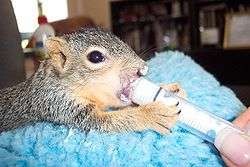Wildlife rehabilitation

Wildlife rehabilitation is the treatment and care of injured, orphaned, or sick wild animals so that they can be released back to the wild.
Process

Rehabilitation begins when an animal is found and reported to a wildlife rehabilitator, or seized from the illegal wildlife trade or a poacher. The rehabilitator will examine the animal to determine the extent of the injury and the probability of successful rehabilitation. If it appears that the animal can make a sufficient recovery to be able to return to the wild, the animal will be fed, nurtured, provided safe temporary housing, and medically treated as necessary.
Animals that cannot be rehabilitated are usually euthanized humanely, although animals are occasionally placed at facilities appropriately licensed for educational exhibit or brought into appropriate lifetime care in a wildlife rescue center.
A non-releasable animal may sometimes be kept by the rehabilitator (under separate permit) as a surrogate parent for orphaned or injured young wildlife.
Background

The field of wildlife rehabilitation varies from small scale operations of individuals working from their homes, usually working with a veterinarian; to professionally staffed wildlife hospitals. Some organizations are teaching wildlife hospitals: Tristate Bird Rescue, Paws Wildlife Center, the Wildlife Center of Virginia, and The Clinic for Rehabilitation of Wildlife provide training to veterinary students from around the world, and offer one-year postdoctoral internships in clinical wildlife medicine.
Another type of wildlife rehabilitator is the Senkwekwe Centre in Virunga National Park in the Democratic Republic of Congo, which cares for the only two orphan baby mountain gorillas in captivity. Their rescue and subsequent survival is considered an important contribution to the conservation of a critically endangered species.
Many wildlife rehabilitators and centers are also committed to improving the well-being of wildlife though public education; focusing on how humans can safely and peacefully coexist with native wildlife, and on wildlife’s importance to humans and the environment. Wildlife rehabilitation clinics can also often offer advice and guidance on humane solutions for "nuisance" wildlife concerns.[1]
Legal issues
In many countries, including the United States and Australia, wildlife rehabilitation requires a license and/or permit. Without permits, it is against the law to rehabilitate (or in some cases possess) a wild animal. In the United States, rehabilitation permits, requirements, and procedures for all animals other than birds vary from state to state.
See also
- Category:Wildlife rehabilitation and conservation centers
- Among The Great Apes With Michelle Yeoh (documentary film about the Sepilok Orang Utan Sanctuary)
References
- ↑ For example, Wild Things Sanctuary: Living with Wildlife
External links
Wildlife rescue organizations
- Orphaned Wildlife Rescue Center-Maryland
- National Wildlife Rehabilitators Association
- International Wildlife Rehabilitation Council
- British Wildlife Rehabilitation Council
- Suncoast Seabird Sanctuary (Florida)
- St. Tiggywinkles
- Tri-State Bird Rescue (Delaware)
- California Council for Wildlife Rehabilitators
- Lindsay Wildlife Museum and Wildlife Hospital, Walnut Creek (N. California)
- Wildlife Rehabilitation Center of Minnesota
- PAWS Wildlife Center (Washington)
- C.R.O.W. Wildlife Clinic
- Carolina Raptor Center (North Carolina)
- Wild Things Sanctuary (New York)
- Animal Advocates Wildlife Rehabilitation
- Second Chance Wildlife Center (Maryland)
- Wildlife Center of Virginia
- Free Again Wildlife Rehabilitation (Illinois)
- Blue Ridge Wildlife Center (Virginia)
- WildCare BayArea, San Rafael (N. California)
- Valley Forge Native Wildlife Refuge (Scotland)
- Directory of British Wildlife Rehabilitators
- Directory of Australian Wildlife Rehabilitation Associations
- Volunteer South Africa Endangered Wildlife Rehabilitation and Breeding Centre
- Red Creek Wildlife Center, Inc. (Pennsylvania)
- Wildlife Rescue Association of B.C.
- Genesis Zoological and Wildlife Rescue (Florida)
- Wild Baby Rescue Center (New Jersey)
- Wildlife Rapid Rescue Team - Wildlife Alliance
- Ohio Wildlife Rehabilitators Association
- Vermont Institute of Natural Science
- Florida Wildlife Hospital & Sanctuary
- Center for Wildlife (Maine)
- Sacred Friends Inc (Virginia)
Information
- USFWS Migratory Bird Permits
- Rescuing Wildlife - A Guide to Helping Injured and Orphaned Animals
- Publication for the public when they find wildlife in distress
- Rehabilitation of baby ground squirrels
- Rehabilitation of baby tree squirrels
- Rehabilitation of baby striped skunks